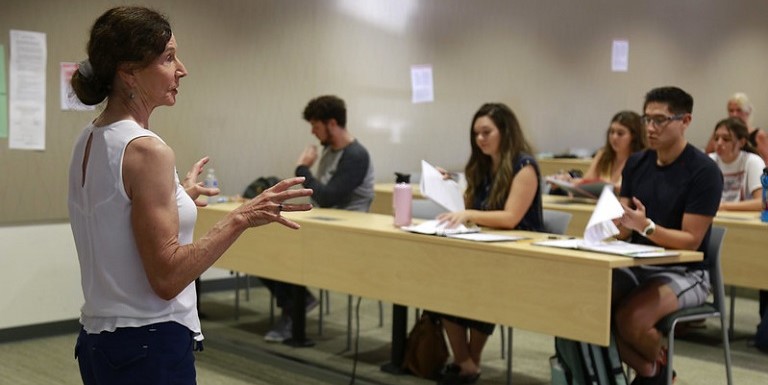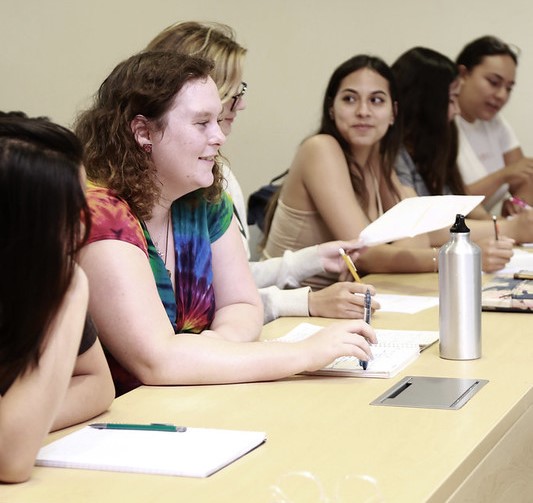Building a Teacher Pipeline at San Diego Mesa College

San Diego Mesa College is partnering with San Diego Unified School District, San Diego State University (SDSU), and National University to mold a new generation of K-12 educators from diverse backgrounds who reflect the students they teach. The Teacher Pathway Inclusion Program was launched in April 2019 and includes a bevy of support services to create a seamless route for high school students to earn a bachelor of arts degree and teaching credential, with an emphasis on filling a growing need in science, mathematics, and special education. Mesa College aims to enroll 50 students transitioning from San Diego Unified each year, with a goal of transferring 30 of those students to National University after two years. San Diego Unified staff is tasked with identifying potential future educators from the ranks of middle and high school students and providing them with the counseling and support needed to reach their goals. In addition, Mesa College is partnering with SDSU on a separate, but related, five-year, federally funded initiative to grow the number of students transferring into SDSU’s bilingual credential program. Mesa College is hoping to send between 20 and 30 students per year to SDSU through the initiative.
“We need to get more teachers of color into our schools,” said Mesa College Professor Laurie Lorence, who is among those in the San Diego Community College District (SDCCD) coordinating the Teacher Pathway Inclusion Program. Indeed, a recent study from the nonprofit Learning Policy Institute found that teachers of color boost the academic performance of students of color (Darling-Hammond et al., 2018). “We want to bring teachers to the classroom who come from the community and who mirror the community,” said Mesa College Vice President of Instruction Isabel O’Connor.
The initiatives come as California is issuing a record number of interim and emergency credentials to teachers to help fill a growing number of staffing shortages. Eighty percent of California public school districts taking part in a Learning Policy Institute survey said they experienced a shortage of qualified teachers for the 2017-2018 school year (Darling-Hammond et al., 2018).
The Teacher Pathway Inclusion Program—funded by Stephen Cushman, Peter Ellsworth, and National University—is the more comprehensive of the initiatives. Participating San Diego Unified students will take dual enrollment courses that count toward both their high school and college diplomas. By providing future teachers free college courses in high school, a free college education at Mesa College through the San Diego Promise, and discounted bachelor’s degree and teaching credential at National University[1], more doors are being opened for a growing number of prospective teachers of color. “Many of the students we’re going after are students who never saw college as an option,” O’Connor said.

The Teacher Pathway Inclusion Program has been under development for the past few years in coordination with National University and its Sanford College of Education, which is the largest single producer of teaching credential candidates in California and among the largest schools of education in the country. “We have been engaging in faculty and administrator discussions. Everybody is vested and is working in tandem on how to best prepare students as they transition and on how to make sure they succeed,” said O’Connor. The results will be almost immediate. Among the dual enrollment courses taught to participating high school students is a tutor-training class. Those who complete the course are eligible to serve as high school tutors.
“We’re all excited about putting this together because it is a comprehensive approach requiring the collaboration of San Diego Unified, the SDCCD, and National University to make sure we adequately support students from underrepresented communities as they embark on their journey toward becoming tomorrow’s teachers,” said National University President David Andrews, who previously served as Dean of the School of Education at Johns Hopkins University. Key to making sure the initiative succeeds, Andrews said, is providing the guidance when a student transitions from one education system to another.
Mesa College has long had a partnership with San Diego Unified. The Mesa College Teacher Education Program, for example, was created a generation ago because too many new teachers, not fully aware of the challenges that come with working in a public school system, were leaving the profession within their first two years. The Teachers Education Program is geared toward cutting that number by providing students a taste of the profession before they transfer to a university and secure a teaching credential. Approximately 200 to 300 students enroll in the program annually, Lorence said. Pedagogy courses include Math for Elementary School Teachers, Music for Elementary School Teachers, Physical Education for Elementary School Teachers, and Teaching as a Profession. Lorence termed the Teacher Pathway Inclusion Program a social justice initiative, and courses taught at Mesa College can include U.S. History from a Black Perspective or Literature from a Chicana/o Perspective.
“Part of building a strong workforce is the development of a diverse teaching pipeline,” said Cheryl Hibbeln, San Diego Unified School District’s Executive Director for School Innovation and Integrated Youth Services, who has been working closely on the project. She continued:
Through a formal partnership between the San Diego Unified School District, Mesa College, and National University, San Diego Unified students will have the opportunity to be supported through the rigorous process of reaching a debt-free college graduation while earning a bachelor’s degree and a teaching credential with the hope that they will return to their local communities as teachers.
“This is a great three-way agreement that will benefit the workforce, that will benefit San Diego Unified, and that will benefit Mesa College in supporting students during their critical years in college. And, it will benefit National University, which is a leader in teacher training,” O’Connor said.
[1] No one in the program will pay more than $7,000 per year, and most will have their National University tuition covered through grants and scholarships.
Reference
Darling-Hammond, L., Sutcher, L., & Carver Thomas, D. (2018, October 15). Teacher shortages in California: Status, sources, and potential solutions. https://learningpolicyinstitute.org/product/teacher-shortages-ca-solutions-brief
David Ogul is President, Ogul Communications, and covers higher education for colleges and universities throughout California.
Opinions expressed in Innovation Showcase are those of the author(s) and do not necessarily reflect those of the League for Innovation in the Community College.










